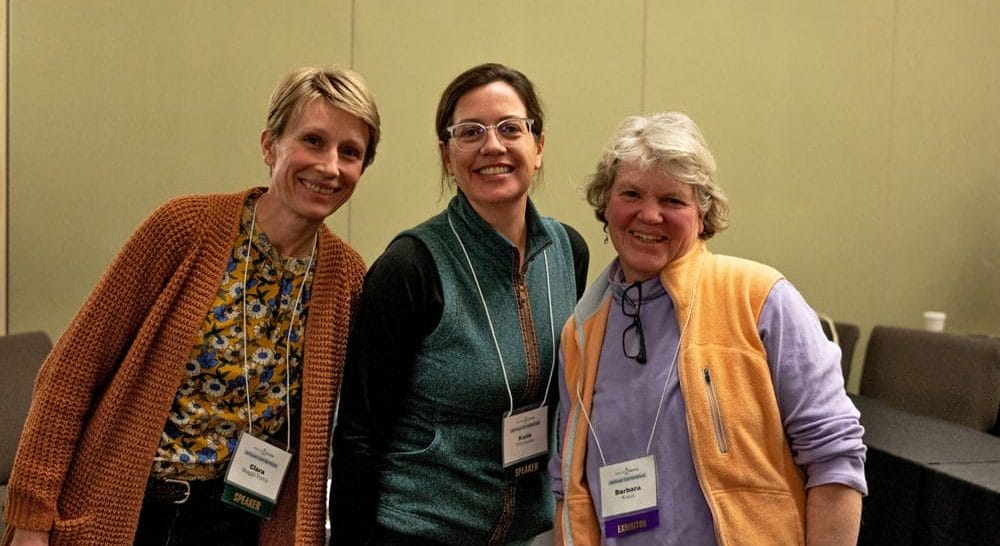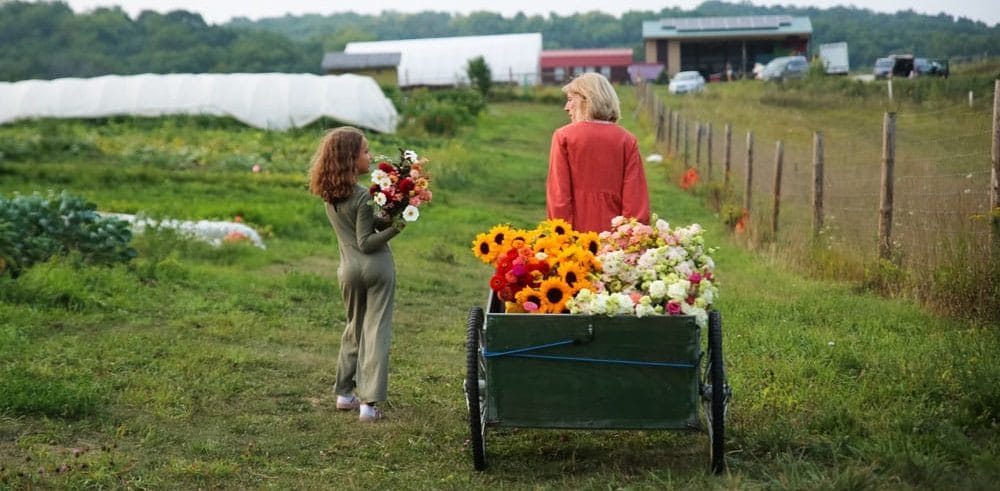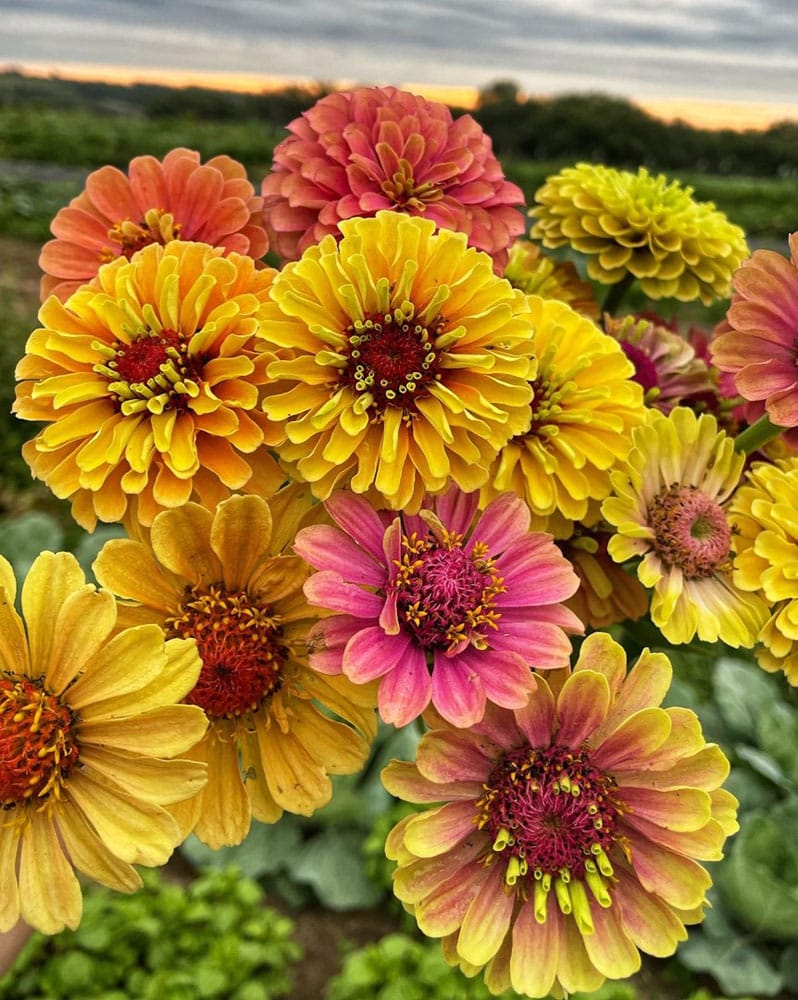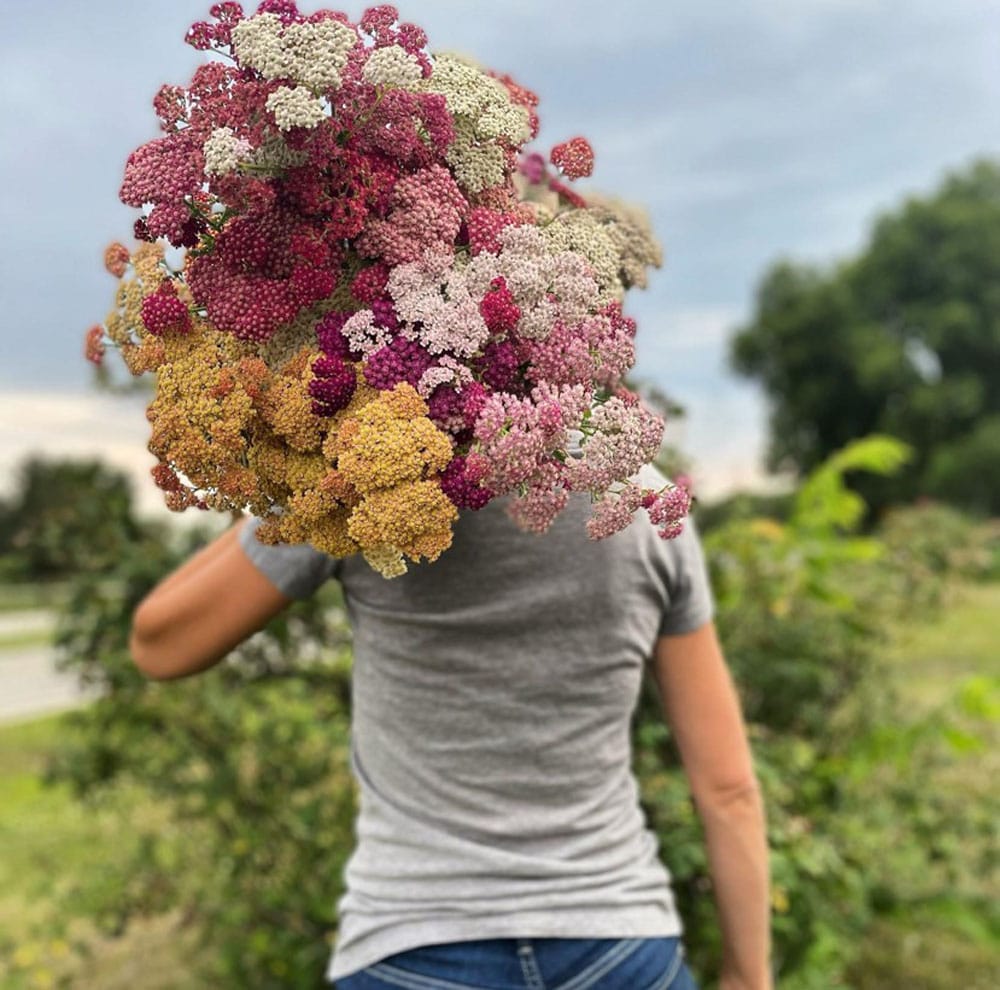Rooted in Collaboration
By organizing a cooperative, three flower farmers in the Decorah area are blooming together.
Taking Root
In the summer of 2022, the number of flower farmers in Decorah, Iowa, was on the rise. Clara Muggli-Toyloy of Oak & Olive Flowers, Katie Prochaska of River Root Farm and Barb Kraus of Canoe Creek Produce were among the growing number of Decorah flower growers.
Clara, Katie and Barb all knew one another through the local network of farmers in their area, and they had already collaborated a bit by buying flowers from each other to supplement their own crops.
That fall, they met up to talk about flowers. But unbeknown to any of them, Katie and Clara both came to the gathering with the same idea in mind: working together more purposefully. “We were already thinking along similar lines,” Clara says.
Rather than compete for the same limited pool of customers, the three women discussed working together for mutual benefit. Growing competition in the area was one reason. But they also felt cooperation would help them address the barriers to finding and serving new markets and the challenges of growing a farm business while juggling the production aspects of raising their flower crops. Beyond these needs, the three all shared a desire for greater collaboration and less business rivalry.
“For me, the addition of a bunch of new flower farmers felt a little bit stressful. But the three of us had built some trust over time by purchasing flowers from one another,” Clara says.
Having discovered they were on the same page about collaborating more formally, the three women jumped in. They aligned around their needs and goals and agreed to create a collaborative plan over the fall and winter. At the start of 2023, they planned to launch the new collective business.
Leafing Out
The three farmers wanted their partnership to start small and be built on trust, so they invested the time at the start. As they worked out their plan, Clara, Katie and Barb made space for long discussions over lunch and chats over coffee to discuss business philosophies, goals and intentions and to ensure alignment about direction, roles and responsibilities.
One of the biggest decisions they needed to make was the business model. Through free coaching from the U.S. Small Business Administration in Winneshiek County, the women explored business structure options. One option was a sole proprietorship through one of their existing farms, which required no articles of incorporation – a setup they ended up veering away from as they wanted to be equally invested.
“It felt so important at the time for it to be a collaboration with the three of us,” Clara says.
A second option was to incorporate as a multimember LLC, which would pass profit and loss through to each individual farmer. The tax implications of this model proved more complex, and it ultimately felt less flexible.
Third, they could form a cooperative, a business structure owned and democratically controlled by members who provide the equity investment. The trio decided this option was the best fit.
Next, they had to decide on marketing. They chose to focus on a wholesale market stream, with florists as their main customers, and selected a simple and recognizable name: Decorah Flower Hub. The online marketplace Rooted Farmers was chosen as a second stream due to its easy sales interface, ability for multiple farmers to add products according to availability, farmer-level payout and accounting features.
Clara credits the Decorah area and its unique context with inspiring their actions. They’d looked to other models of flower farmer collectives in the Midwest, but didn’t feel those were transferrable to rural northeastern Iowa. The Michigan Flower Growers’ Collective, for instance, offers an aggregated marketplace and delivery service in Ann Arbor. In Minnesota, the Twin Cities Flower Exchange is a physical wholesale market with 100% locally sourced, chemical-free flowers that serves area flower businesses.
“Being in a community like Decorah set the stage for us to think collaboratively rather than competitively,” Clara says, referencing Oneota Food Co-op, the city’s 50-year-old cooperative grocery store. “Groups like PFI help to foster that collaboration as well.”
Buds and Thorns
The journey hasn’t been without its share of bumps, however. 2024 marks year two of the Decorah Flower Hub, and Clara says that by June, the reality – and the struggle – of starting a new venture had set in.
“This year feels harder because we’re at the sales and marketing phase,” she says.
Katie explains that this season, Decorah Flower Hub has the same number of wholesale customers as 2023 – “which is like two people,” she says. “2023 was a pilot year. We are finding that growth takes time. And we are also learning to function as partners in this venture.”
One challenge has been growing their customer base. Orders from florists, their main sales focus, have fallen short of their revenue goal.
“We did networking lunches with florists in the spring. It was lovely, and they all said positive things,” Clara says. “But now, they just aren’t ordering.” Achieving their goals, the women are learning, may mean doing more than just sending out an availability list.
For instance, Katie says not all florists want to order on a website every week; some prefer a phone call. While florists have praised the quality of their flowers, Clara says the onus is on the farmers to be more proactive.
“It’s going to be a process of increased community education, persistence and lots of follow-up with customers,” she says. Katie agrees. “We need to elevate the ‘why’ of our crops in terms of labor impacts, pollution and more. It’s equally as important as the ‘why’ of local food.”
Taking a broader view, Clara reflects on what others thinking of a collaborative farm model should know. “If I could offer advice, it would be to figure out how to fund someone to keep hours going toward marketing. Since we’re all doing the growing as well as the marketing, we are all just really stretched.”
Clara emphasizes that the collaboration has been worth it.
“The cooperative model is flexible, and we could shift tactics going forward. The Decorah Flower Hub can adapt to suit its members.”
The women are also able to learn from and support one another, whether sharing growing techniques, supplementing each other’s harvests and connecting through social get-togethers.
The farmers are also quick to point out how the collaboration has opened new opportunities. “Now, I know I can say yes to weddings because I can supplement from what Barb and Katie have available,” Clara says. “Working together feels better. We feel like we’re in it together.”
Ready to Bloom
As they approach the end of their second season, the winds might be shifting. Word about the Decorah Flower Hub is spreading. Phelps Farm near Guttenberg, Iowa, not far from Decorah, signed on to the cooperative for the 2024 season to test it out. And growers elsewhere in the state have reached out to learn more.
Central Iowa farmers Catherine Schut of Hive & Petal Bees & Blooms in Prairie City, and Tara Bird of Wild Bird Farm at Madrid, along with PFI’s business viability manager, Savanah Laur, met with Clara and Katie to learn about their process and ask questions. After talking through the ins and outs of starting a regional, cooperative flower hub in Iowa, the farmers eschewed the idea – at least for now.
But the appeal of collaboration is strong: Catherine and Tara plan to team up to fill large orders, thus expanding their market options. They also agreed to align their crop planning for the coming season. Clearly, more lies ahead for groups of flower farmers all around Iowa. And while collaboration may not provide quick fixes to all the problems, like market security, it does offer significant benefits.
“Farming can be really lonely,” Clara says. “It’s great to find a community of people who make me feel supported and held moving forward with my business. I’m grateful for that.”
Learn More
Katie, Clara and Barb presented about their collaboration at the 2024 PFI Annual Conference.
View their presentation, “Piloting the Decorah Flower Hub,” at practicalfarmers.org/2024-conference-materials.




